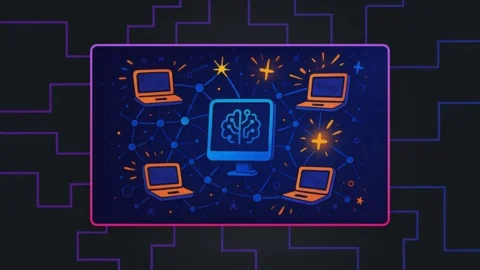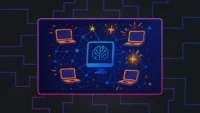
71% Off AI Agents & Workflows – The Practical Guide Udemy coupon

Copy this code and use at checkout
71% Off AI Agents & Workflows – The Practical Guide Udemy coupon
Expires: No Expires
Submitted: 3 months ago
I. Course Overview & Core Purpose
The course, “AI Agents & Workflows: The Practical Guide,” aims to equip individuals with the practical skills to build AI-powered applications and automate tasks using “agentic systems.” While acknowledging “AI Agents” as a “buzzword,” the course prioritizes practical application and understanding of how Large Language Models (LLMs), “normal code,” and data collaborate to create functional AI solutions. The central promise is to “unlock an entire new world of opportunities,” enabling users to automate tasks across diverse domains, from “data transformation to content generation, customer service or automated research.”
II. Key Distinctions and Relationships: AI Agents vs. AI Workflows
A fundamental objective of the course is to clearly define and differentiate between “AI Agents” and “AI Workflows,” while also explaining how they relate to each other. The course emphasizes that both are crucial components for building AI-powered applications.
III. Practical Application and Building Blocks
The course is highly practical, focusing on hands-on application and providing concrete code snippets. Key areas of focus include:
- Building from Scratch: Learners will acquire the ability to “build AI Workflows & Agents from scratch.”
- LLM Integration: The course extensively covers “How to use OpenAI’s models (via API & SDK) programmatically,” providing a concrete framework for integrating LLMs into custom applications.
- Data Transformation: A significant application area is “How to transform input data with AI,” highlighting the utility of AI in data manipulation.
- Automation: A core theme is “How to build AI-powered automations,” reinforcing the course’s objective of enabling task automation.
- Third-Party Interactions: The curriculum includes instruction on “How to interact with third-party services like Slack,” demonstrating the ability of AI systems to connect with external platforms.
- Advanced Agentic Concepts:Self-Evaluation: Learners will understand “How use AI for self-evaluation,” indicating a focus on more sophisticated agent behaviors.
- Memory Management: The course addresses “How to manage short- and long-term memory for your AI Agents,” crucial for persistent and context-aware agents.
- Multi-Agent Systems: A key advanced topic is “How to build Multi-Agent systems and share data between agents,” suggesting the creation of collaborative AI entities. This also includes learning “How to split work between universal and specialized Agents.”
- Human-in-the-Loop: The course emphasizes practical control and oversight by teaching “How to add a Human-in-the-Loop step to your workflows.”
IV. Target Audience and Prerequisites
The course is designed for “Developer who want to build AI-powered workflows & applications” and “Everyone who wants to automate work with AI workflows & agents.” A crucial requirement is “Basic programming knowledge,” though “NO advanced AI or programming experienced is needed,” making it accessible to a broad range of developers. While code examples primarily use Python and OpenAI API/SDK, the “knowledge to any programming language or model” is transferable.
V. Instructor Background and Pedagogy
Maximilian Schwarzmüller, the instructor, brings extensive experience as both a “freelance web developer and consultant” and an “Instructor.” His background as a “self-taught developer” informs his teaching approach, enabling him to “focus on the most relevant key concepts and topics.” His proven track record includes “many 5-star rated courses and more than 2,000,000 students on Udemy,” highlighting his pedagogical expertise and ability to deliver impactful learning experiences.
Frequently Asked Questions
What are AI Agents and AI Workflows, and how do they differ?
AI Agents are a specific type of AI system capable of independent action, often equipped with tools and memory, to achieve a goal. AI Workflows, on the other hand, are sequences of steps, some of which may be powered by AI (including AI Agents), designed to automate tasks. While “AI Agents” is a popular term, the course emphasizes understanding how both agents and workflows contribute to building AI-powered applications. Workflows can incorporate agents, and agents often operate within a broader workflow.
What kinds of tasks can be automated using AI Agents and Workflows?
The potential applications for AI-powered automations using agents and workflows are vast, limited only by imagination. Examples provided include data transformation, content generation, customer service, and automated research. The course aims to equip learners to build applications for these and many other use cases, enabling them to automate various aspects of their work.
What technical skills are required to learn about and build these systems?
A basic programming knowledge is a prerequisite for this course. However, it explicitly states that no advanced AI or programming experience is needed. The course is designed to be accessible to developers who want to build AI-powered workflows and applications, providing a solid foundation in the crucial theory and practical implementation without requiring prior deep AI expertise.
How does this course approach the “buzzword” aspect of AI Agents?
The course acknowledges that “AI Agents” is a buzzword but aims to move beyond it by providing a practical and comprehensive understanding of the underlying concepts. It focuses on explaining what AI Agents are, how they relate to AI Workflows, and how to build and use both effectively. The goal is to provide concrete theory, examples, and code snippets to ensure a deep understanding of how LLMs, “normal code,” and data collaborate to create AI-powered applications.
What specific technologies and tools will be covered in the course?
While the core concepts are applicable to any programming language or AI model, the course’s code examples utilize Python and the OpenAI API/SDK. Learners will learn how to use OpenAI’s models programmatically, equip Large Language Models (LLMs) with tools like web search, and build their own agents or use existing tools like CrewAI. The course also covers interacting with third-party services like Slack and managing memory for AI Agents.
Will I learn how to build complex AI systems with multiple agents?
Yes, the course covers the development of Multi-Agent Systems. This includes learning how to build systems where multiple agents cooperate, share data, and split work between universal and specialized agents. It also teaches how to incorporate a “Human-in-the-Loop” step into workflows, allowing for human oversight and intervention when necessary.
What is the instructor’s background and teaching philosophy?
Maximilian Schwarzmüller is an experienced full-stack web developer and consultant with a background in both technical development and business administration. As a self-taught developer, he emphasizes focusing on key concepts and difficult topics that are most relevant to learners. His teaching philosophy is to empower students to build real-world applications, find better jobs, or pursue their hobbies with the knowledge gained from his courses, as evidenced by his strong track record and large student base.
What practical outcomes can I expect from completing this course?
Upon completion, learners will be able to describe and build AI Agents, construct AI-powered Workflows to automate tasks, build Multi-Agent Systems, and understand the distinctions and relationships between agents and workflows. They will gain practical skills in leveraging tools, using the OpenAI API/SDK, equipping LLMs with tools, and building various AI-powered automations, ultimately enabling them to create their own AI-powered applications and agentic systems.


Loading comments....